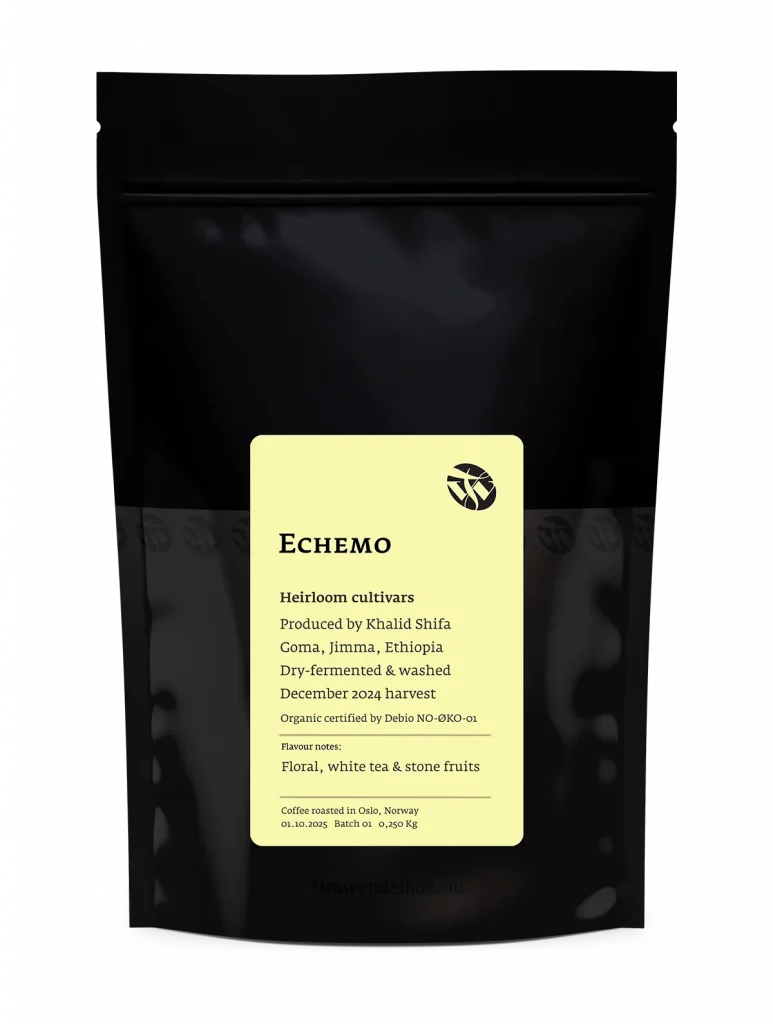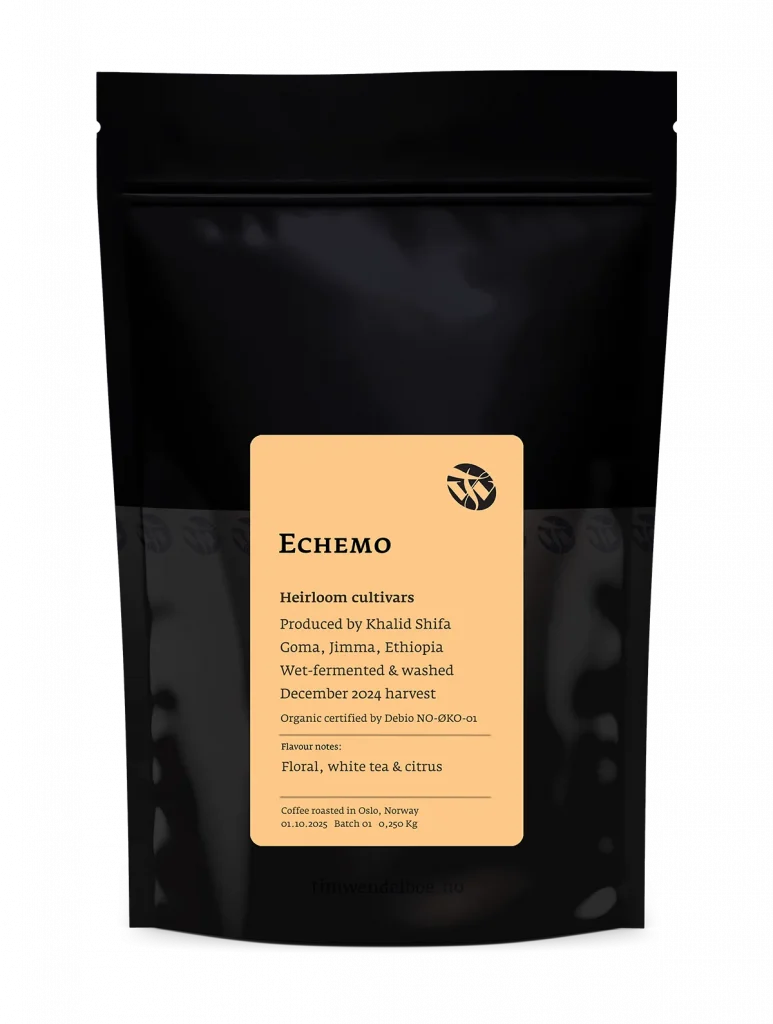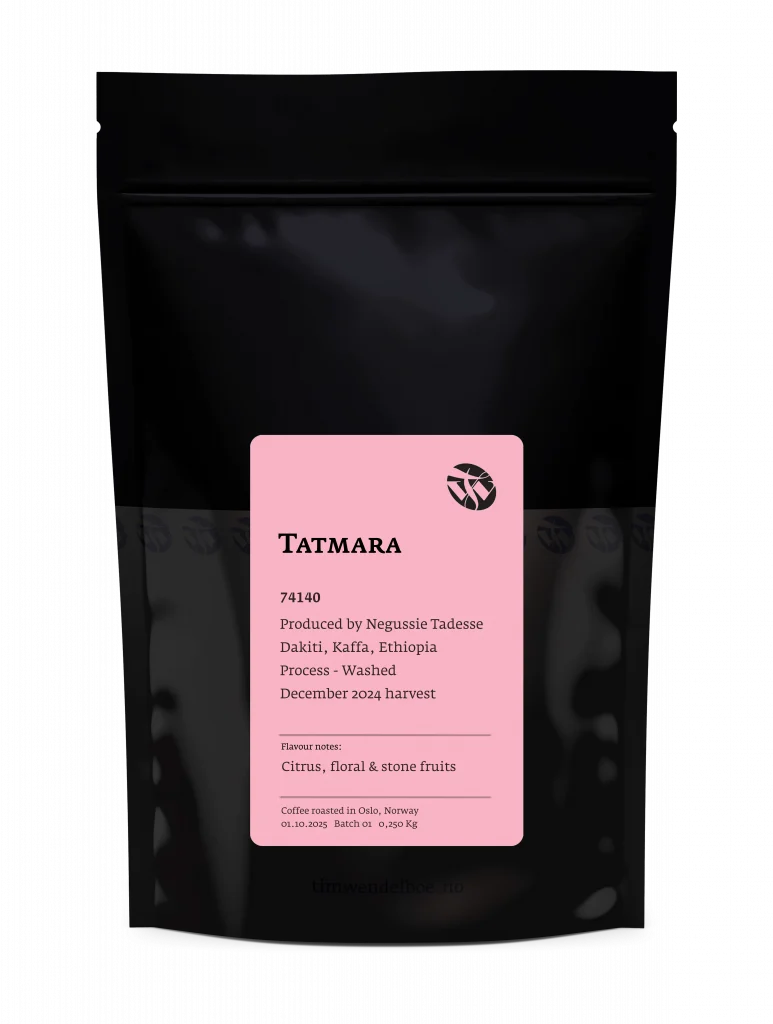Dear coffee subscriber,
Finally, the Ethiopian coffees have arrived and we are so pleased to be able to send out these floral coffees to all our subscribers.
This month, I have selected two coffees from Echemo that are very similar in flavour, yet they have subtle differences as they are fermented in different ways during the post-harvest process. We are also including a tiny lot from Tatmara, which is from a single cultivar, 74140, that I find has a different flavour profile compared to the “heirloom” cultivars from Echemo. I hope you will enjoy these coffees.
Please note that, like many Ethiopian and Geisha coffees, these can produce a bit more fines (dust) during grinding, which means the paper filter may clog when brewing filter-style methods such as V60, Kalita or similar. As a result, you might experience much longer brew times. My recommendation is not to grind coarser, but rather to agitate the slurry less during brewing and allow a little more time for it to finish. Higher extractions only make this coffee more aromatic and sweet.
Echemo - Dry-fermented (1st & 4th bag)

Flavour notes
Floral, white tea & stone fruits
Producer
Khalid Shifa
Harvest
December 2024
Origin
Goma, Jimma, Ethiopia
Process
Dry-fermented & washed
Cultivar
Heirloom from Coche forest
Organic certified by Debio NO-ØKO-01
We have been buying coffees from Khalid for many years now, but it was not until my visit to his farm in November 2023 that I was able to make an impact on the quality of his coffees. During that visit, I was able to go through his production steps to see if we could agree upon a protocol for him to follow in order to try to elevate the quality of his coffees. As usual, there were many small details that could be improved, some with minor and others with major impact on the final quality. A few of the major ones included separation of every daily picking, keeping each daily lot stored in airtight GrainPro bags after drying. Drying the coffees under shade nets, keeping better control of the fermentation, and slightly changing the process were also part of what we changed and improved. This meant that I was able to evaluate several samples, each representing a daily picking, instead of just 2–3 samples like in previous years where the coffees had been bulked together.
By doing this, we were able to remove the lower qualities from the higher quality lots, and in combination with better processing and drying practices, the coffees really cleaned up and became more expressive. We would, of course, not be able to change all this in such a short time had it not been for the wonderful help and follow-up done by Fantanesh Keleme and the whole team at Belco in Ethiopia, who made sure Khalid understood and followed the protocols for all the coffees he produced for us.
We also milled the coffees in a smaller dry mill this year, where we were able to also vacuum pack the coffees before export. This helps preserve the coffee’s flavour and freshness for a much longer time.
The washed coffees from Echemo are very delicate and soft. I find it is like drinking a white tea with some nice notes of peach and florals. It is very different from the typical Yirgacheffe or Guji coffees from the south of Ethiopia, most likely because it is grown in a different area and is from different cultivars.
The first and second bag we are sending out in this month’s subscription are actually from the same farm and the same cultivar. The only difference between the two coffees is the way they are fermented during the post-harvest process. The first bag is what we call dry-fermented. This means that after de-pulping (removing the skin and pulp from the coffee beans), the coffee is fermented in a cement tank that only contains the parchment coffee with its mucilage on. This is typically called dry fermentation and is quite common in Colombia, Kenya and many other coffee-producing countries. The benefits are that you use less water during fermentation, and the fermentation is normally faster due to more available oxygen and higher temperatures in the pile of coffee. It can easily be controlled if the climate is not too hot, but in hot conditions, the fermentation can speed up and create undesirable flavours if not controlled well. This lot consists of several pickings. They were all dry-fermented for about 24 hours before they were washed and dried on raised beds under shade.
I personally think this lot has more stone fruit character and orange blossom notes in the cup compared to the wet-fermented coffee described below.
Echemo - Wet-fermented (2nd & 5th bag)

Flavour notes
Floral, white tea & citrus
Producer
Khalid Shifa
Harvest
December 2024
Origin
Goma, Jimma, Ethiopia
Process
Wet-fermented & washed
Cultivar
Heirloom from Coche forest
Organic certified by Debio NO-ØKO-01
This particular lot has been processed in the more traditional way in Ethiopia, which means it is wet-fermented.
Wet fermentation is done by submerging the parchment coffee (with the mucilage left on) under clean, cold water during fermentation. The fermentation typically slows down due to reduced oxygen availability in the water and also due to the lower temperatures in the coffee pile during fermentation.
This lot consists of several daily pickings. They were all wet-fermented for about 36–48 hours before they were washed and dried on raised beds under shade. Personally, I get more delicate white tea notes in this coffee, along with lemon and jasmine notes.
Tatmara (3rd & 6th bag)

Flavour notes
Milk chocolate, floral & tangerine
Producer
Diego Baraona
Harvest
February 2023
Origin
Tecapa-Chinameca, Usulutan, El Salvador
Process
Semi-washed
Cultivar
Geisha
In 2022, we held a fundraiser during our 15-year anniversary and collected money that we donated to Negussie in order to fund the construction of a new wet mill on his farm. The wet mill was completed in October 2023, and I was able to be there to oversee the first lot being processed at the new mill. It was very beneficial to be present right at the start of the harvest, as it meant we could see the mill in use, identify any risks, and create a protocol for how we wanted our coffees to be processed.
As with the coffees we buy from Echemo, we asked Negussie to separate all daily pickings, dry the coffees under shade nets, and store them in airtight GrainPro bags after drying, ensuring that each daily picking was properly marked. We also agreed upon the processing protocol, securing good results by controlling fermentation and implementing soaking of the coffee after the mucilage was mechanically removed.
As soon as the coffees were dried, samples were sent to us in Oslo so we could provide feedback and evaluate the quality. The harvest went really well, thanks in large part to the support and follow-up from Fantanesh Keleme and the whole team at Belco in Ethiopia, who made sure Negussie was properly trained and followed the protocols for all the coffees he produced for us. In fact, none of the washed coffees were rejected, as they all ended up tasting really good.
This year, we were able to separate three of Negussie’s cultivars: 74110, 74112, and 74140. They all originate from seeds developed at the Jimma Agricultural Research Center and belong to the so-called “new and improved” cultivars now commonly planted across Ethiopia. This particular lot is a blend of six daily pickings of cultivar 74140. At Tatmara, all the washed coffees are dry-fermented for about 24 hours before being washed and dried on raised beds under shade. I love how bright and intense this coffee is, with peachy stone fruit flavours, jasmine, and citrus notes.
